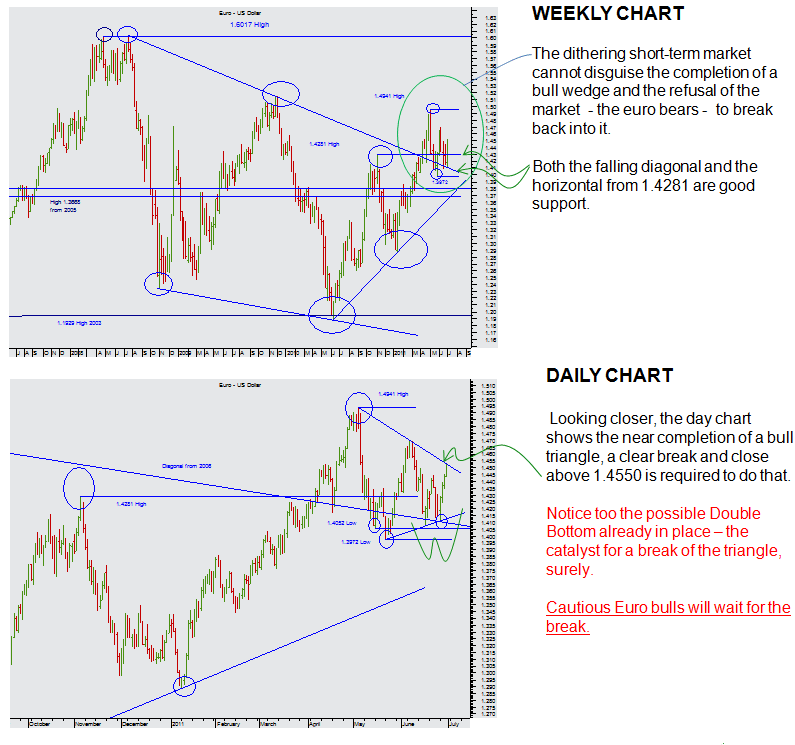Is the Euro in the Clear?
Currencies / Euro Jul 01, 2011 - 06:00 AM GMTBy: Seven_Days_Ahead
 The Greek Parliament has voted to accept the austerity measures demanded by the IMF/EU/EZ in return for additional financial assistance, is the crisis for the Euro zone over or is it just a sticking plaster applied to a deeper wound?
The Greek Parliament has voted to accept the austerity measures demanded by the IMF/EU/EZ in return for additional financial assistance, is the crisis for the Euro zone over or is it just a sticking plaster applied to a deeper wound?

FUNDAMENTALS:
The Greek Parliament has voted to accept the austerity measures demanded by the IMF/EU/EZ in return for additional financial assistance, is the crisis for the Euro zone over or is it just a sticking plaster applied to a deeper wound?
Until the latest saga of the Euro zone debt crisis, centred on Greece emerged early in May, the Euro looked set to extend what was a well-established bull trend against the Dollar, driven on by:
But all that was pushed to one side when the Greek debt crisis forced its way back to centre stage. It was immediately clear that without a new rescue package Greece would more than likely default.
The rating agencies saw this and repeatedly downgraded Greek debt to a level consistent with imminent default. Much was written about the crisis and it was suggested Greece leave the Euro and devalue its way out of trouble, but both the Greek and Euro zone authorities ruled this out as even a remote possibility.
Now the Greek Parliament has narrowly voted to accept the austerity measures the Euro has rallied, but the Greek people are on the streets protesting against measures that they intuitively judge will retard economic growth and impoverish them for many years, and for what? Membership of the Euro.
For now the markets have breathed a sigh of relief. Greece will get her money and default has been avoided. The spotlight is now back on the US with its sluggish growth, bloated budget deficit and quarrelling politicians that are unable to agree a debt reduction plan.
The House Republicans are refusing to allow an extension of the US debt ceiling, using it as a stick to force Obama into agree to a broad-based debt reduction strategy. But unless the ceiling is lifted, the US will be unable to meet an interest payment on Government debt that falls due on August 4th; that’s Monday of next week.
In an effort to nudge the US towards commonsense, the rating agencies have said the US credit ratting would be reduced several notches to reflect the fact of selective default, while we think the authorities will raise the ceiling, the Dollar is the victim.
The Euro zone debt crisis has dominated for more than a year, but the US is running its own fiscal circus. Many US states have a debt situation at least as bad as Greece, so if the Greeks are able to get their house in order, will the US become the next point of focus for those fearing a developed nation will soon default?
We don’t think the US will default. We doubt a meaningful debt reduction program will be agreed before the 2012 US Presidential elections and suspect there may well be several more chapters of this high stakes game of ‘Chicken’ before a deal is finally reached, but the US authorities on both sides of the political spectrum are smart enough to understand the damage even a limited default would do to US credibility and the financial system.
What then of the Euro?
We judge the Euro is likely to enjoy a limited rally on relief that a Greek default has for now been avoided. But why did Greece need extra help when the 1st deal she reached was deemed sufficient, if not generous enough to ensure set the Greek house in order.
The reason is clear. The austerity measures shrink GDP, this makes it harder for Greece to service her debts as the pot from which her wealth is drawn has shrunk. We judge the same spiral of despair will start all over again and in several months time Greece will be back with the begging bowl seeking more help.
So in summary, yes the Euro can enjoy a relief rally, but longer term, unless the likes of Greece are offered either:
This whole sorry saga is set to repeat, sending the Euro lower.
Clinton turned record budget deficits into sizeable surpluses. The difference between now and then is the US is fighting a costly war in Afghanistan and has recently fought a costly war in Iraq and they are draining US resources. Nonetheless, in the long run the US will tackle her debt burden..
Mark Sturdy
John Lewis
Seven Days Ahead
Be sure to sign up for and receive these articles automatically at Market Updates
Mark Sturdy, John Lewis & Philip Allwright, write exclusively for Seven Days Ahead a regulated financial advisor selling professional-level technical and macro analysis and high-performing trade recommendations with detailed risk control for banks, hedge funds, and expert private investors around the world. Check out our subscriptions.
© 2011 Copyright Seven Days Ahead - All Rights Reserved
Disclaimer: The above is a matter of opinion provided for general information purposes only and is not intended as investment advice. Information and analysis above are derived from sources and utilising methods believed to be reliable, but we cannot accept responsibility for any losses you may incur as a result of this analysis. Individuals should consult with their personal financial advisors.
Seven Days Ahead Archive |
© 2005-2022 http://www.MarketOracle.co.uk - The Market Oracle is a FREE Daily Financial Markets Analysis & Forecasting online publication.



